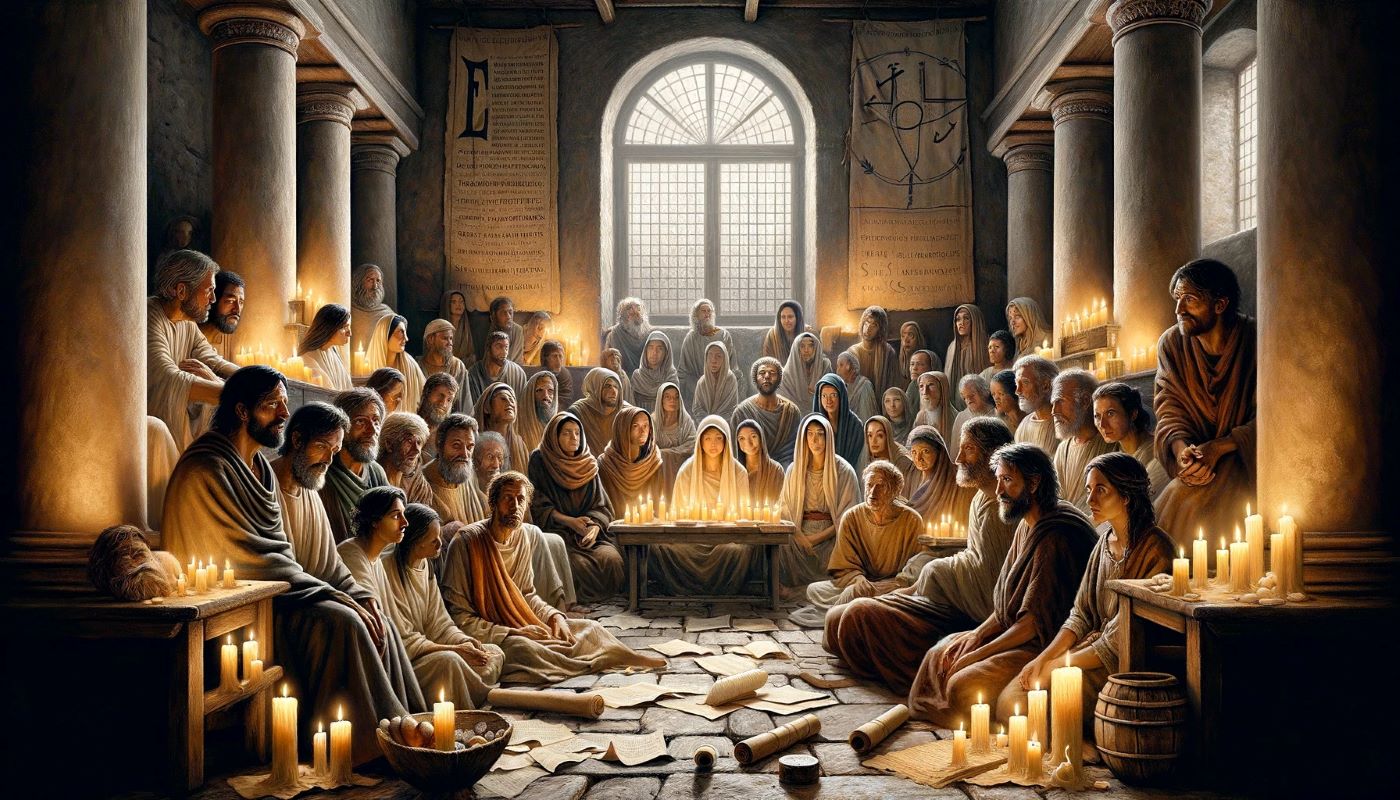Home>Theology and Spirituality>What Does “There But For The Grace Of God” Mean


Theology and Spirituality
What Does “There But For The Grace Of God” Mean
Published: March 7, 2024
Peter Smith, Editorial Director at Christian.net, combines deep insights into faith, politics, and culture to lead content creation that resonates widely. Awarded for his contributions to religious discourse, he previously headed a major organization for religious communicators, enhancing dialogue on faith's societal impacts.
Discover the meaning of the phrase "There but for the grace of God" and its significance in theology and spirituality. Explore its implications and interpretations.
(Many of the links in this article redirect to a specific reviewed product. Your purchase of these products through affiliate links helps to generate commission for Christian.net, at no extra cost. Learn more)
Table of Contents
Understanding the Phrase "There But For The Grace Of God"
The phrase "There but for the grace of God" is a popular expression that acknowledges the role of divine intervention or mercy in preventing someone from experiencing a negative outcome. It reflects the idea that one's own good fortune or positive circumstances are not solely a result of personal merit, but also of the benevolence of a higher power. This phrase is often used to convey humility, gratitude, and empathy towards others who may not have been as fortunate. It serves as a reminder of the unpredictable nature of life and the role of providence in shaping individual destinies.
The phrase "There but for the grace of God" encapsulates the belief that one's current situation or well-being is ultimately attributed to the mercy or favor of a higher spiritual force. It implies that without this divine intervention, one could have easily found themselves in a less favorable or more challenging position. The phrase underscores the concept of humility and gratitude, acknowledging that personal achievements and circumstances are not solely a result of individual effort, but are also influenced by external factors beyond one's control.
The expression "There but for the grace of God" is often used to convey a sense of empathy and understanding towards others who may be facing difficulties or adversity. It serves as a reminder that the fortunes of life are not always within one's control, and that compassion and support for those less fortunate are essential virtues. By recognizing the role of divine grace in shaping individual circumstances, the phrase encourages a perspective of humility and compassion, fostering a sense of interconnectedness and shared humanity.
In essence, the phrase "There but for the grace of God" serves as a poignant reminder of the unpredictable nature of life and the role of divine benevolence in shaping human experiences. It encourages individuals to approach their own circumstances with humility and gratitude, while also fostering empathy and compassion towards others who may be facing challenges. This expression reflects a deep-seated acknowledgment of the interconnectedness of human experiences and the role of providence in shaping individual destinies.
Read more: What Does God’s Grace Mean?
Origins and History of the Phrase
-
Biblical Roots: The phrase "There but for the grace of God" finds its origins in Christian theology, reflecting the belief in the grace and mercy of God as central tenets of the faith. The concept of divine grace, which denotes the unmerited favor and benevolence of God towards humanity, has been a fundamental theme in Christian teachings. The phrase encapsulates the idea that one's well-being and favorable circumstances are ultimately attributed to the grace of God, rather than solely to individual merit or effort.
-
Theological Significance: The notion of divine grace has been a prominent theme in the writings of theologians and religious scholars throughout history. It is deeply rooted in the teachings of the apostle Paul in the New Testament, particularly in his letters to the early Christian communities. Paul's discussions on grace emphasized the idea that salvation and spiritual blessings are bestowed upon individuals through the unmerited favor of God, rather than as a result of their own actions or deserving.
-
Evolution of the Phrase: Over time, the phrase "There but for the grace of God" became integrated into Christian discourse, reflecting the understanding that one's circumstances and well-being are ultimately dependent on the mercy and favor of God. It has been used to convey a sense of humility, gratitude, and recognition of the role of divine intervention in shaping human destinies. The phrase has also transcended its religious origins and has been embraced as a universal expression of humility and empathy across different cultural and spiritual contexts.
-
Literary and Cultural Impact: The phrase has permeated various literary works, sermons, and cultural expressions, reflecting its enduring significance in conveying the fragility of human existence and the role of divine providence. Its resonance extends beyond religious circles, as it has been embraced as a reflection of the unpredictable nature of life and the interconnectedness of human experiences. The phrase continues to evoke contemplation on the role of grace, humility, and empathy in navigating the complexities of human existence.
-
Continued Relevance: In contemporary discourse, the phrase "There but for the grace of God" continues to hold profound significance, serving as a poignant reminder of the role of providence in shaping individual circumstances. Its enduring presence in religious, literary, and cultural contexts underscores its timeless relevance as a reflection of the human experience and the enduring quest for understanding the mysteries of fate and fortune.
Interpretations and Usage of the Phrase in Modern Contexts
-
Humility and Gratitude: In modern contexts, the phrase "There but for the grace of God" continues to be employed to evoke a sense of humility and gratitude. Individuals use it to acknowledge their own good fortune while recognizing that external factors, including divine intervention, have played a role in shaping their circumstances. It serves as a reminder to remain humble and appreciative of the blessings one has received.
-
Empathy and Compassion: The phrase is also utilized to express empathy and compassion towards others facing adversity. By acknowledging the role of divine grace in shaping one's own life, individuals are encouraged to extend understanding and support to those who may not have been as fortunate. It fosters a spirit of empathy, reminding people of the interconnectedness of human experiences and the importance of showing compassion to others.
-
Reflection on Life's Uncertainties: In modern usage, the phrase prompts contemplation on the unpredictability of life and the recognition that circumstances can change in an instant. It encourages individuals to reflect on the fragility of human existence and the role of providence in determining outcomes. This reflection often leads to a deeper appreciation for the present and a heightened awareness of life's uncertainties.
-
Acknowledgment of Shared Humanity: The phrase serves as a unifying expression that transcends religious boundaries, emphasizing the shared human experience. It underscores the idea that regardless of individual beliefs, people are interconnected through the common threads of gratitude, empathy, and the acknowledgment of external influences on their lives. This inclusive interpretation highlights the phrase's relevance in fostering a sense of unity and understanding among diverse communities.
-
Cultural and Artistic Expressions: Modern literature, music, and art often incorporate the phrase "There but for the grace of God" to convey themes of humility, empathy, and the mysteries of fate. It has become a poignant motif in creative works, resonating with audiences by capturing the complexities of the human condition and the role of divine benevolence in shaping individual destinies. Its usage in contemporary cultural expressions further solidifies its enduring significance in modern contexts.
In contemporary society, the phrase "There but for the grace of God" continues to hold profound meaning, serving as a powerful reminder of the interconnectedness of human experiences and the role of divine intervention in shaping individual lives. Its versatile interpretations and usage in modern contexts reflect its enduring relevance as a timeless expression of humility, empathy, and the acknowledgment of life's uncertainties.
Examples of the Phrase in Literature and Popular Culture
-
Literary Works: The phrase "There but for the grace of God" has been prominently featured in numerous literary works, showcasing its enduring presence in the world of literature. Authors have utilized the phrase to imbue their writings with themes of humility, gratitude, and the recognition of divine influence in human affairs. From classic novels to contemporary fiction, the phrase has served as a poignant reminder of the role of providence in shaping individual destinies.
-
Film and Television: In popular culture, the phrase "There but for the grace of God" has found its way into the dialogue of films and television shows, reflecting its resonance with audiences. Scriptwriters often incorporate the phrase to convey moments of introspection, empathy, and the acknowledgment of life's uncertainties. Its inclusion in visual media serves to underscore its enduring relevance as a reflection of the human experience and the role of divine benevolence.
-
Music and Song Lyrics: Songwriters and musicians have also drawn upon the phrase "There but for the grace of God" to infuse their lyrics with themes of humility, empathy, and the mysteries of fate. Whether in soulful ballads or uplifting anthems, the phrase has been woven into musical compositions, resonating with listeners and evoking contemplation on the interconnectedness of human experiences. Its presence in music further solidifies its status as a universal expression of gratitude and compassion.
-
Artistic Interpretations: Visual artists have incorporated the phrase "There but for the grace of God" into their works, using it as a motif to convey profound reflections on the human condition. Paintings, sculptures, and other forms of artistic expression have been enriched by the inclusion of this timeless phrase, serving as a testament to its enduring significance in the realm of artistic creation. Its presence in artistic interpretations underscores its ability to evoke contemplation and empathy across diverse forms of expression.
-
Cultural References: Beyond specific works of literature and art, the phrase "There but for the grace of God" has permeated cultural references and everyday discourse. It has become a familiar expression in conversations, serving as a reminder of the role of divine intervention in shaping individual circumstances. Its widespread usage in cultural contexts reflects its status as a universal sentiment that transcends religious and societal boundaries, resonating with people from diverse backgrounds.
In literature and popular culture, the phrase "There but for the grace of God" has left an indelible mark, serving as a timeless expression of humility, empathy, and the acknowledgment of life's uncertainties. Its presence across various artistic mediums and cultural contexts underscores its enduring relevance as a reflection of the interconnectedness of human experiences and the role of divine benevolence in shaping individual destinies.















